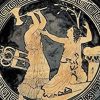2. Who speaks the prologue to Agamemnon? What is the purpose of this speech? 3. How is Agamemnon ultimately responsible for his own downfall? What sins is he guilty of committing? 4. How are Aeschylus’ religious doctrines that wisdom is learned through suffering and that retribution comes to all sinners […]
Read more Study Help Essay QuestionsCritical Essay Aristotle on Tragedy
The aim of tragedy, Aristotle writes, is to bring about a “catharsis” of the spectators — to arouse in them sensations of pity and fear, and to purge them of these emotions so that they leave the theater feeling cleansed and uplifted, with a heightened understanding of the ways of […]
Read more Critical Essay Aristotle on TragedySurviving Dramatic Works of Aeschylus
The Persians Part of a tetralogy that was first performed at the dramatic festival of 472 B.C. and won first prize, the choregus for this production was the famous Athenian statesman Pericles. The names of the other plays in the tetralogy are known, but they seem to bear no relation […]
Read more Surviving Dramatic Works of AeschylusAeschylus Biography
Aeschylus, who was born in 525 B.C., lived through these stirring events and shared the pride of all Athenians in the achievements of their city. In a sense, Aeschylus was a founding father of this new Athens, for he was one of the famed “Men of Marathon,” the gallant band […]
Read more Aeschylus BiographySummary and Analysis The Eumenides: Fifth Episode and Exodos (Lines 793-1047)
The chorus repeat their threats and insist that they have been insulted by the Athenians. Athene pleads with them to reconsider. She tells them to be reasonable, to accept the will of Zeus and the honors offered them by Athens. The Furies lament the unjust treatment they have received. They […]
Read more Summary and Analysis The Eumenides: Fifth Episode and Exodos (Lines 793-1047)Summary and Analysis The Eumenides: Fourth Episode (Lines 566-776)
The chorus question Orestes. He admits having killed Clytaemestra but says that he was ordered to commit the crime by Apollo. He demands to know why the Furies did not punish Clytaemestra for the murder of Agamemnon. They reply that Clytaemestra has already been punished by her death at his […]
Read more Summary and Analysis The Eumenides: Fourth Episode (Lines 566-776)Summary and Analysis The Eumenides: Third Stasimon (Lines 490-565)
Fear of authority and punishment is an essential element of society, the foundation of all law and order, for it restrains men from crime. It is themselves, the Furies, who embody this authority. They never harm good men who are innocent of evil, but hunt down and punish all transgressors. […]
Read more Summary and Analysis The Eumenides: Third Stasimon (Lines 490-565)Summary and Analysis The Eumenides: Third Episode (Lines 396-489)
The Furies explain that Orestes is guilty of matricide. After questioning them further, Athene remarks that they seem more concerned with the forms of justice than with justice itself. The Furies invite her to interrogate Orestes and decide for herself about his guilt. Athene agrees but insists that the final […]
Read more Summary and Analysis The Eumenides: Third Episode (Lines 396-489)Summary and Analysis The Eumenides: Second Stasimon (Lines 307-395)
Analysis The ancient conception of justice represented by the Furies is explained in this ode. They stand for the primitive lex talionis, or law of retaliation — the criminal is punished by being made the victim of the same crime he committed (“an eye for an eye”), and the ties […]
Read more Summary and Analysis The Eumenides: Second Stasimon (Lines 307-395)Summary and Analysis The Eumenides: Second Episode (Lines 179-243)
The chorus demand that Apollo acknowledge his own guilt in this crime, for it was he who ordered Orestes to commit matricide. Apollo defends himself by saying he ordered Orestes to avenge the murder of Agamemnon. In response, the Furies accuse Apollo of having given sanctuary to Orestes despite his […]
Read more Summary and Analysis The Eumenides: Second Episode (Lines 179-243)
